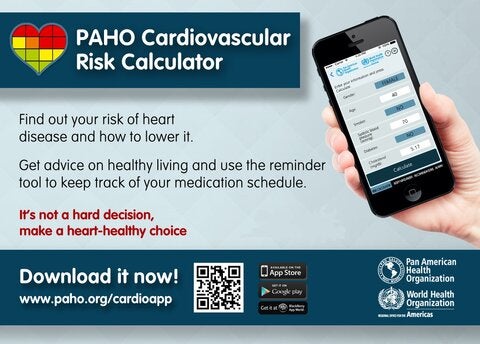This application for mobile devices and computers is designed to help the user estimate the risk of developing significant cardiovascular diseases within the next ten years, such as myocardial infarction, angina pectoris, or stroke. It is entirely based on the World Health Organization formula for estimating cardiovascular risk in Latin America and the Caribbean, zone AMR-B. This risk assessment takes into account various regional adaptations based on the findings of the Framingham study.
Download the application here:
- For PC: /cardioapp/web
- For IPhone (for Android is not available at the moment)
- For using offline please download and install on you Desktop or Laptop
This application also calculates the body mass index by entering weight and height, and has a reminder functionality for medication, that allows the user to register the medication prescription and set alarms to help prevent treatment interruptions. It also offers a series of recommendations and strategies the user can adopt to modify their cardiovascular risk.
It also aims to help physicians rapidly estimate the cardiovascular risk of their patients and discuss and analyze with them how the risk can be modified. It also intends motivate users to become invested in their health, enabling them to make informed decisions as to whether they should seek medical advice if their risk is high.
Glomerular Filtration Rate module to estimate kidney function
The application has been updated with a new module to estimate glomerular filtration to assess the state of kidney function. It uses the parameters of creatinine in blood, age, gender, and whether the person is of African descent.
If the estimated glomerular filtration rate is below 60 mL/minute, some degree of kidney damage is likely. In that case, it is recommended to consult a medical professional who will interpret the result in the specific context of each patient.
Estimated glomerular filtration is useful in determining the state of renal function while there are still no clinical manifestations, and in monitoring the condition of patients with chronic kidney disease (CKD). CKD tends to be silent and only presents clinical signs and symptoms in advanced stages.
Precautions in use
This calculator is not intended to replace medical advice or clinical judgment.
Read more: pdfTutorial Cardioapp
Links:

